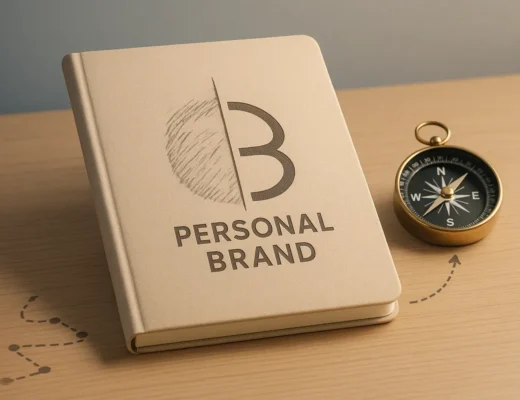How to Strengthen Your Personal Brand: 18 Helpful Habits
We asked industry experts to share one habit they’ve developed that has contributed significantly to strengthening their personal brand — and how others can cultivate this habit. Their strategies focus on authenticity, consistent content creation, and building genuine connections rather than self-promotion. Discover 18 helpful methods for developing your unique voice while maintaining transparency and vulnerability.
- Write Consistently to Develop Your Voice
- Develop Clarity Through Structured Reflection
- Show Up as Real Instead of Perfect
- Step Outside Your Comfort Zone Consistently
- Become a Knowledge-Sharing Leader
- Build Direct Channels to Your Audience
- Practice Authentic Vulnerability Behind Your Work
- Help on Reddit Without Self-Promotion
- Publish Honest Insights About Your Journey
- Focus on Problem-Solving Over Self-Promotion
- Connect Through Consistent Personal Storytelling
- Show Transparency About Building Something Sustainable
- Maintain Authenticity Against AI Content Saturation
- Cultivate Compassion Over Sales Mentality
- Share Practical Insights with Authentic Engagement
- Create Strategic Niche Content for Clients
- Engage Actively Across Social Platforms
- Build Genuine Professional Visibility
Write Consistently to Develop Your Voice
One habit that’s made the biggest difference for my personal brand is writing consistently, especially when I don’t feel fully prepared.
Most people wait for the perfect idea, the right timing, or some groundbreaking insight before sharing content. I fell into that trap early in my career, too. But I discovered that consistency actually builds clarity. Each time I wrote something, I gained a better understanding of my audience, found my authentic tone, and sharpened my positioning. It wasn’t algorithms that made me visible; it was the repetition and regularity of my content.
If you’re looking to build this habit yourself, start small. Choose just one platform. Commit to posting once a week, even if it’s just a brief insight, personal reflection, or story from your work. Don’t chase viral content; instead, focus on truth and usefulness. Over time, your distinct voice becomes your signature, and that’s ultimately what people remember about you.

Develop Clarity Through Structured Reflection
The habit that’s strengthened my personal brand the most is what I call “Clarity Journaling.”
It’s not journaling in the soft, fluffy sense — it’s a deliberate weekly ritual I started years ago to get the noise out of my head and the signal back in focus.
Every Friday, I sit down with a notebook and ask myself five questions:
-
What did I say yes to this week that I didn’t need to?
-
What still feels foggy or off-brand?
-
What message am I repeating that people are resonating with?
-
What did I learn about how I want to show up next week?
-
Where am I forcing something that doesn’t fit anymore?
That 30-minute ritual has become the backbone of how I lead, write, and communicate. It keeps me aligned with my own brand, which, honestly, is the hardest brand to stay true to.
This habit also built my consistency muscle. I didn’t need to be everywhere all the time. I just needed to be clear every time I did show up.
When you’re clear, you’re memorable. When you’re consistent, you’re trusted. And that combination — clarity + consistency — is what creates brand gravity.
If you want to build this habit yourself, keep it simple:
-
Don’t overthink it. You don’t need a new system, just a recurring moment of truth with yourself.
-
Make it a ritual, not a reaction. Same day, same time each week.
-
Treat it as a mirror, not a marketing plan. It’s not about polishing your image — it’s about staying in integrity with your message.
The result? A brand that evolves with you, not around you.

Gina Dunn, Founder and Brand Strategist, OG Solutions
Show Up as Real Instead of Perfect
The best thing I ever did for my personal brand was stop pretending to be interesting and just be real. People can spot a performance from a mile away. The internet doesn’t need another expert trying to sound smart; it needs people who actually have something to say. When you stop trying to impress everyone, you start attracting the ones who matter.
I make it a habit to show up as I am, not as who I think people expect. Some days that means sharing an insight about brand attention, and other days it means admitting a campaign didn’t hit right away. That kind of honesty builds trust. You do not need to have a perfect story; you just have to tell a true one.
Take Carved for example. They are a small-batch phone case company known for turning wood and resin into one-of-a-kind tech accessories. When they partnered with us, they weren’t chasing hype, they were chasing connection. We helped them own their story instead of dressing it up, focusing on what made them stand out as creators who build everything by hand. That approach helped them land features in Forbes, CNET, and The Verge, and their monthly traffic jumped by 23%. Real storytelling built real credibility.
If you want to build your own brand, start by dropping the filter. Talk like you would to someone who already believes in you. Share what’s actually working, what isn’t, and what you are learning along the way. People follow confidence, not perfection. The moment you stop curating every sentence and start showing up as a person, your brand finally starts sounding like you.

Step Outside Your Comfort Zone Consistently
For me as a brand and web designer, the habit that has most strengthened and helped my personal brand grow is literally just stepping out of my comfort zone and consistently showing up, even when it feels uncomfortable. For example, I started doing reels, which used to feel really scary for me, and doing so as a non-native English speaker has had its challenges. I’m still learning a lot, but honestly, it has helped me so much. I’ve also pushed myself to meet new people and even started hosting my own group for women entrepreneurs, which has been an amazing way to build real connections.
When you’re a business owner who is building their personal brand, it’s important to know how to be a leader. That means showcasing your expertise and not being afraid to try new things. Personally, I focus on sharing valuable and helpful content that builds trust with my audience and community. But not only that. I also am transparent about my journey, talking about my wins and struggles, and sharing some behind-the-scenes moments. I also share parts of my personal life because I want people to see the real me, not just the professional side.
Also, a really important thing that has changed a lot for me has been engaging with people online, networking, and genuinely caring about others. I’ve found that showing my authentic self, aka my personality, quirks, story, values, and even a little bit of humor, is what helps me really connect with the right people and bring in those who are also interested in my offers.
Even though it’s still a work in progress, I’m already building a space where people feel seen and understood. That’s what I love most about my work and building my personal brand.
Here are my tips for others looking to strengthen their personal brand and what habits they can start doing: start small by sharing parts of your journey with your audience, for example your story, your wins, and even your struggles. Also show the behind-the-scenes process of your work. Engage consistently and care genuinely about your community. And honestly, just don’t be afraid to try things that feel uncomfortable. It’s normal at first to feel this way, but it’ll be so worth it. Over time, showing up authentically and stepping out of your comfort zone will help you build a brand that truly resonates.

Become a Knowledge-Sharing Leader
One of the activities which has most definitely reinforced my personal brand is the consistent practice of sharing knowledge. The sharing of information, experiences, and expertise among my professional network is a practice I have cultivated — be it via LinkedIn posts, conversations among the team, or exchange of ideas in the industry.
Amazingly, this practice grants you the ability to become a generous enlightenment leader instead of merely being a voice looking for attention. I set aside time every week to analyze the things I have learned, the obstacles I have overcome, and the viewpoints I have acquired, then turn those into practical tips that anyone can put into use.
Ways through which others can adopt this practice:
Go slowly and be persistent. It is not necessary to compose lengthy essays — just start with one insightful thought a week. It might be a lesson from a task, a book which has changed your outlook, or a comment about your sector.
Give priority to value rather than visibility. Think of it this way, “Is it going to be helpful for someone to overcome a problem or to think in a new way?” instead of, “Will it generate engagement?” Authenticity is much more powerful than polished perfection.
Create a basic system. I have a continuous note on my mobile where I write down “shareable moments” each week. When it’s time to share or contribute, I’m never starting from nothing.
Engage with other people’s posts in a thoughtful way. Knowledge sharing is a two-way street. Make thoughtful comments on others’ posts, ask questions, and create real connections. This not only increases your visibility but also strengthens your authority.
The cumulative effect of regular knowledge sharing is truly impressive as it not only builds trust but also opens up surprising opportunities and positions you as a person who adds value wherever you go.

Build Direct Channels to Your Audience
One habit I’ve developed is building direct channels to my audience, rather than relying on the algorithms of social platforms, which are constantly changing. Publishing thought leadership in respected industry journals creates durability and credibility.
This only works if the content carries weight. The Edelman-LinkedIn study shows buyers view high-quality thought leadership as more influential than marketing, especially for unseen stakeholders. And with Gartner noting B2B purchases now involve 11 to 20 stakeholders, addressing multiple perspectives (finance, IT, operations) is essential.
The key is consistency. HBR reminds us that trust compounds through rhythm, not one-off “hero” posts. I maintain a cadence of monthly bylines, weekly LinkedIn posts, and quarterly briefs. You can start by publishing one byline a month, sharing it across owned channels, and measuring engagement. Over time, the habit shifts your brand from being visible to being valuable. And value is what earns invitations to the conversations that matter: budget reviews with CFOs, integration roadmaps with CIOs, and strategy sessions with business leaders planning their next wave of automation.

Practice Authentic Vulnerability Behind Your Work
One habit that has significantly strengthened my personal brand is practicing authentic vulnerability by sharing the human journey behind my work rather than just highlighting expertise. This insight came after a brand strategist pointed out that I was focusing too heavily on my strategic AI knowledge while burying the personal elements that create genuine connections. Others looking to cultivate this habit should regularly reflect on what parts of their professional journey, especially including challenges and setbacks, will strike a chord with their audience and intentionally incorporate these stories into their communications. Demonstrating vulnerability builds trust and distinguishes your personal brand in ways that technical credentials alone cannot.
Help on Reddit Without Self-Promotion
I spend 30 minutes being active on Reddit, just helping where I can. I have a post on my profile linking to my website, but I don’t promote my services or myself; I’m simply just being helpful.
I recommend everyone do this. Not only does it feel good to help where you can, but you also learn so much about your industry, potential clients, and what issues people are having at the moment, which you might be able to build solutions for.
It’s a win-win, it’s super simple to do, and it’s something I’ll continue to do.
Publish Honest Insights About Your Journey
I’m an entrepreneur and co-founder of a marketing company who’s built a trusted personal brand with almost one thousand valuable and niche connections from scratch by openly sharing “stories and insights” on blogs in the entrepreneurship space and LinkedIn.
After five years of growing my reputation, I consistently hear from clients and partners that honest storytelling, especially the stories that didn’t go as planned, distinguishes my personal brand from other personal brands.
The one simple weekly habit that will help you succeed with your personal brand is publishing quick, honest insights (even when they reveal stumbles or failures that others can learn from).
Going about your personal brand like this is very effective. Why? Because it will build trust and authenticity, plus you just need to block 30 minutes on your calendar each week to write about a real challenge, event, or story that impacted you and that might have a positive effect on your audience.

Focus on Problem-Solving Over Self-Promotion
One habit that has strengthened my personal brand is focusing on quiet problem-solving over self-promotion. I try my best to investigate challenges, share practical solutions, and help others avoid the same mistakes I made. Over time, this consistency built a reputation for reliability and expertise. Entrepreneurs and working professionals in general can cultivate this habit by identifying problems in their industry and providing genuine advice rather than a quote that sounds like a personal advertisement.
Connect Through Consistent Personal Storytelling
One habit that has strengthened my personal brand over the years is consistent storytelling. I make a conscious effort to articulate not just what I do, but why I do it, through every conversation, social post, and product decision. People remember stories, not job titles. By connecting my personal story with my professional mission, I’ve built a brand that feels genuine and human rather than corporate or promotional.
For others, the best way to develop this habit is to start documenting small reflections about their work, the motivations behind choices, lessons from failures, and what excites them about the future. Over time, these thoughts create a narrative thread that forms your brand’s backbone. Authenticity doesn’t come from grand gestures; it grows through showing up consistently, speaking from your values, and letting others see the process behind your success. The more you share your story, the more people will trust and connect with it.

Show Transparency About Building Something Sustainable
One habit that’s had the biggest impact on strengthening my personal brand is showing up with transparency about the work it takes to build something sustainable. In my experience, people relate more to honesty than to perfectly curated success. I started sharing the small decisions that go into growing a private practice: the lessons from mistakes, the trial-and-error of refining systems, and even the mindset shifts that come with scaling. Over time, those glimpses behind the scenes built genuine connection and credibility far more effectively than polished marketing ever could.
For me, this habit also keeps me grounded. The more I teach others how to streamline their own practices and create financial stability, the more I’m reminded to stay intentional in my own business. Sharing what I’m learning as I go helps me evolve alongside my clients, rather than simply instructing from a distance.
If someone wants to cultivate the same habit, I’d suggest starting with one authentic story each week, something that reflects both growth and imperfection. Consistent, real communication creates a brand that feels human and trustworthy. In my opinion, authenticity becomes the strongest form of marketing there is.

Maintain Authenticity Against AI Content Saturation
Ever since the AI craze started, I’ve made a promise to myself to never fully rely on AI when it comes to my personal branding. A personal brand is exactly that — personal, and I want it to be the best of me, faults and all. The internet is getting increasingly plagued with AI bots speaking to one another, and I sense that people are already getting sick of it. Having a creator that you can rely on to deliver something different and authentic will be a huge advantage in the future, and it’s best to start early.
Cultivate Compassion Over Sales Mentality
As a psychologist and business owner, the power of compassion is at the core of my personal brand and has been monumental in my professional growth. When potential clients contact me, my aim is to help each individual feel understood and to provide detailed information to help the person make an informed decision regarding their next steps, whether that is through my business or another route. My genuine desire to help versus to just “make a sale” stems from compassion. Just like all skills, compassion is a skill that can be learned and developed. One way to build compassion is to notice one’s judgments of others and oneself and to work on embracing a nonjudgmental and curious mindset. There are also self-help books that delve deeper into the strategies and practices for developing compassion and self-compassion.
Share Practical Insights with Authentic Engagement
Consistently sharing practical insights while prioritizing authentic engagement has been the most impactful habit in strengthening my personal brand. I’ve found that when you focus on providing genuine value through your expertise rather than obvious self-promotion, people naturally become interested in what you have to say. Building meaningful relationships and engaging sincerely with others creates a reputation that attracts opportunities organically. Anyone looking to cultivate this habit should start by identifying their unique expertise and commit to regularly sharing practical solutions with their network.
Create Strategic Niche Content for Clients
Creating authoritative niche content and thought leadership pieces has gone a long way for me. Not only does it build context for my brand to get picked up organically (via search engines and AI tools), but it also brings value to potential clients, keeping them on my site and encouraging them to convert. The topics are strategically designed to hit on very specific client challenges at various stages of a client funnel.
Engage Actively Across Social Platforms
One habit that has significantly strengthened my personal brand is staying active on social media, particularly on LinkedIn, Twitter, and Reddit. I make it a point to engage with others by answering questions, sharing insights, and adding value to discussions. This not only helps build credibility and visibility but also allows me to continuously learn from industry peers and stay updated with the latest trends. Others can cultivate this habit by setting aside time each week to contribute meaningfully to conversations within their professional communities.
Build Genuine Professional Visibility
One of the most effective habits that strengthened my personal brand was building genuine professional visibility. I follow top and mid-level managers, as well as colleagues I work with, and I share my achievements on social media through short stories rather than posts — it keeps things authentic and not intrusive. I also make a point to stay in touch with former colleagues, sending simple greetings on holidays or birthdays.
But this only works if you’ve already earned credibility within your company and achieved real results. Otherwise, it can have the opposite effect.

























